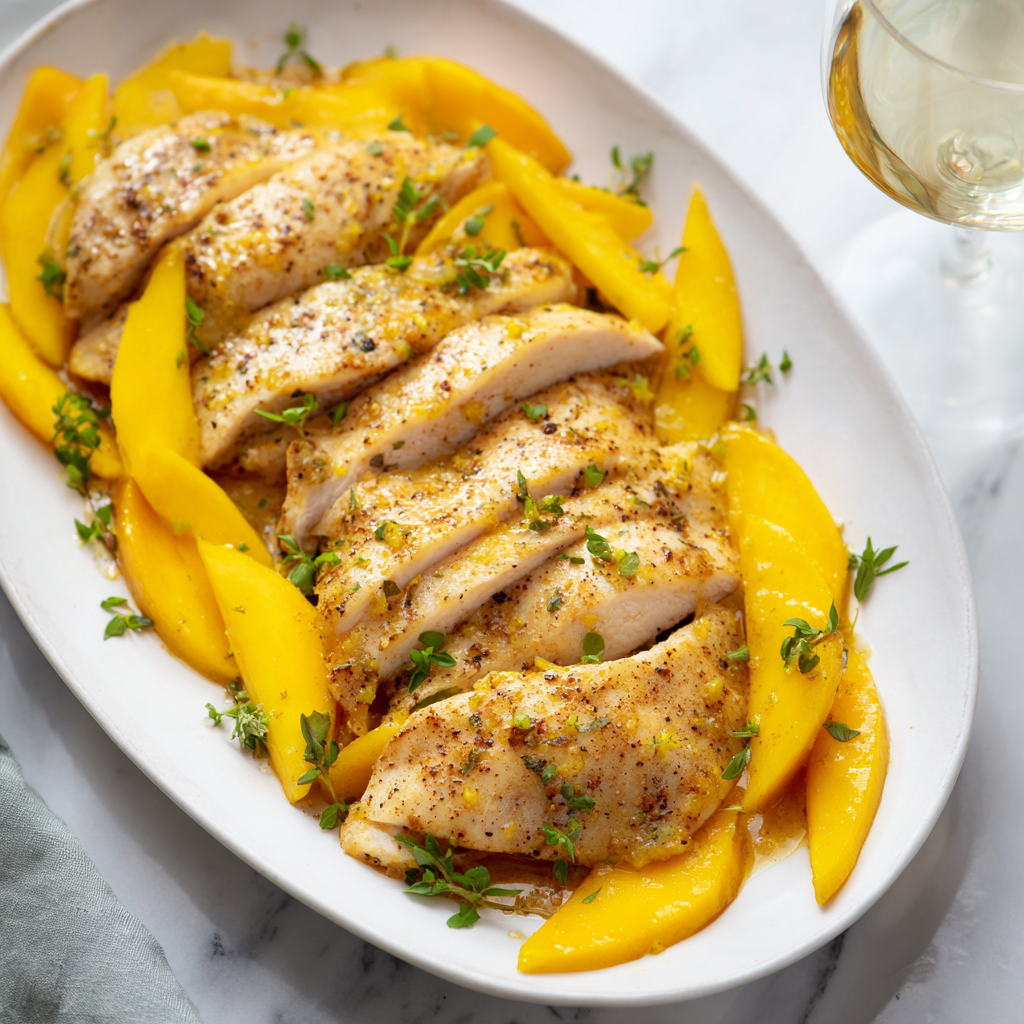Introduction
Picture a warm evening, a gentle breeze, and a plate of tender fish glistening on your plate, topped with sweet, sun-kissed mango — that’s what this Mango Mahi Mahi brings to your table. The fish itself has a mild, slightly sweet flavor and delicate flakiness; seared to golden perfection, it offers a gentle, buttery bite that melts in your mouth. Then — the mango sauce: bright, juicy, and slightly tangy, bursting with tropical freshness. The contrast between flaky, savory fish and vibrant mango makes each bite feel like a mini escape to a sunny beachside dinner. It’s simple elegance — unpretentious, comforting, and yet refined enough for a dinner you’d be proud to serve loved ones.
This dish is perfect when you crave something light but satisfying, something that feels a bit luxurious but doesn’t require hours in the kitchen. It’s also ideal when mangoes are at their best — fragrant and juicy — letting you enjoy a taste of summer any time you prepare it. Whether it’s a cozy weekday dinner or a small celebration, this Mango Mahi Mahi delivers warmth, freshness, and a delightful balance of flavors and textures.
Why You’ll Love This Recipe
- Tender, flaky mahi mahi with a perfectly seared crust and buttery flavor.
- Sweet-tangy mango sauce — fresh, fruity, and aromatic, it elevates the fish without overpowering it.
- Quick and simple — ready in under 30 minutes, ideal for busy evenings or spontaneous dinners.
- Bright and fresh yet comforting — a light, healthy meal that still feels special.
- Versatile and shareable — great for family dinners, date nights, or casual entertaining with friends.
Ingredients
- 4 fillets of mahi mahi (about 6 oz / 170 g each — fresh or thawed if frozen)
- Juice of 1 large lemon, divided
- Salt and freshly ground black pepper, to taste
- ⅓ cup all-purpose flour, for light dredging (optional)
- 4 tablespoons (½ stick) unsalted butter, divided
- 1 teaspoon neutral oil (e.g. vegetable or avocado oil)
- 1 large ripe mango, peeled and sliced into long pieces (or cut to your preference)
- ½ cup dry white wine (optional — choose a wine you enjoy drinking)
- ½ cup light broth (vegetable or chicken — or water if you prefer lighter taste)
- Optional for serving: rice (plain, coconut or pilaf), leafy greens or salad, lime wedges, fresh herbs (cilantro or parsley)
Instructions
- Season the fish.
- Pat the mahi mahi fillets dry. Drizzle lightly with half of the lemon juice, then season with salt and pepper on both sides.
- If using, lightly dust each fillet with flour, shaking off any excess. This helps with a light crust when seared.
- Sear the fish.
- In a large skillet, heat 2 tablespoons butter + 1 teaspoon oil over medium heat until the butter melts and the pan is hot.
- Add the fillets and sear for 3–4 minutes per side, until golden brown, crisp around edges, and fish is opaque and flakes easily. Carefully transfer to a foil-lined plate and cover to keep warm.
- Make the mango sauce.
- In the same skillet (don’t wipe it clean), add the remaining 2 tablespoons butter, white wine, broth, and the remaining lemon juice. Bring to a simmer.
- Let the liquid reduce slightly (about 3–4 minutes), then add the mango slices. Let them heat through gently, releasing their juices to create a sweet-tangy sauce — about 2–3 minutes.
- Finish the dish.
- Return the mahi mahi fillets to the skillet, spooning some mango and sauce over them. Warm through for another 1–2 minutes so the flavors meld.
- Taste the sauce and adjust seasoning with salt and pepper as needed.
- Serve.
- Plate each fillet, spooning generous mango and sauce over the top. Serve immediately — ideally over rice, coconut rice, or a light salad — and garnish with fresh herbs or lime wedges if desired.
You Must Know (Helpful Tips)
- Make sure the skillet is properly preheated before adding fish — a hot pan yields a beautiful sear without sticking, giving a crisp-buttery crust.
- Don’t overcrowd the pan — sear fillets in batches if needed to avoid steaming instead of searing.
- Use ripe, sweet mangoes — they provide natural sweetness and juicy texture; underripe mango will not yield the bright, fresh sauce desired.
- Adjust liquid reduction carefully — simmer until the sauce slightly thickens but before it evaporates completely; you want enough sauce to coat the fish and rice.
- Serve immediately — the contrast between warm fish and sweet-sauced mango is best right away; leftover fish will lose some of its charm once cooled.
Storage Tips
- This dish is best enjoyed freshly made — for best texture and flavor, avoid storing assembled fish.
- If you have leftover fish or mango sauce: store them separately, cooled, in airtight containers in the fridge for up to 2 days.
- To reheat: gently warm the fish and sauce in a skillet over low heat, just until warmed through. Avoid microwave if possible — it can make the fish dry and ruin texture.
Ingredient Substitutions
- Mahi mahi → other firm white fish (such as cod, halibut, or sea bass): adjust cooking time as needed — slightly shorter for thinner fillets.
- Butter + oil → olive oil (or plant-based butter) if you prefer lighter or dairy-free version; flavor will be milder but still pleasant.
- White wine → additional broth or citrus juice (e.g. lime, orange) if you avoid alcohol or want a lighter sauce.
- Mango → mango-pineapple salsa or fruit medley (e.g. mango + pineapple + red pepper + herbs) — adds complexity and extra freshness.
- Serve on rice → serve with quinoa, couscous, or a crisp salad for variation in texture and nutrition.
Serving Suggestions
- Serve atop fluffy coconut rice or plain jasmine rice to soak up the mango sauce.
- Add a side of steamed or sautéed greens (e.g. spinach, zucchini, green beans) for a balanced meal.
- Offer lime wedges and fresh herbs (cilantro or parsley) for people to add brightness and freshness at the table.
- Pair with a light, crisp white wine (if you drink) or a citrus-infused sparkling water for a refreshing contrast to the richness of the butter and sweetness of the mango.
Pro Tips
- For extra fresh flavor, finish with a small squeeze of lime just before serving — it brightens the mango sauce beautifully and balances richness.
- If you want a slightly more tropical or exotic twist, add a pinch of grated ginger or a splash of lime juice to the sauce along with mango.
- For a more refined presentation, slice mango thinly and fan it around the fish, then drizzle sauce artfully — looks elegant on the plate.
- If you’re serving guests, prepare the sauce while rice or side dish is cooking, then sear fish just before people arrive — ensures fish is hot, sauce fresh, and meal feels effortless but special.
Frequently Asked Questions (FAQ)
Q: Can I use frozen mahi mahi fillets?
A: Yes — just thaw them fully in the fridge, pat dry, and proceed. Once thawed, treat them like fresh fillets and sear gently — cooking time may slightly increase depending on thickness.
Q: My mango isn’t very sweet — will the sauce still taste good?
A: You can add a small drizzle of honey or a pinch of sugar when simmering the sauce to enhance sweetness. Alternatively, mix in a splash of citrus (lime or orange juice) to brighten flavors and compensate for less sweet mango.
Q: I don’t have white wine — can I skip it?
A: Definitely. You can replace the white wine with additional broth or a splash of citrus juice (like lime or orange) — the sauce will be slightly less complex, but still delicious and fruity.
Q: Can I grill the fish instead of pan-searing?
A: Yes! Lightly oil and season the fish, then grill on medium-high heat until cooked through (about 4–5 min per side depending on thickness). Prepare the mango sauce separately on the stove, then pour over grilled fish before serving.
Q: Can I use other fruits instead of mango?
A: Absolutely. Pineapple, peaches, or a tropical fruit mix can work well. You may need to adjust cooking times slightly depending on fruit firmness — softer fruits may cook faster and release juices sooner.
Closing Sentence
Fresh, vibrant, and tender — this Mango Mahi Mahi brings together gentle sea flavors and tropical sweetness in a way that feels both relaxed and special. I hope preparing it fills your kitchen with sunshine and brings a little taste of summer to your table.



